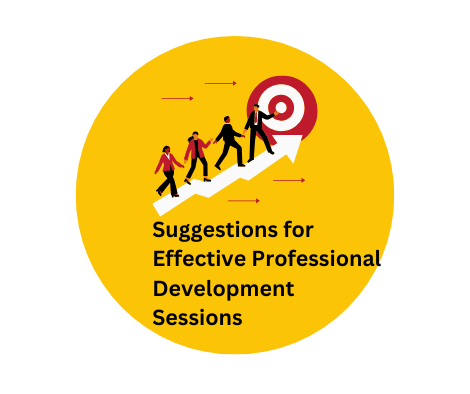
Suggestions for Effective Professional Development Sessions
More than once within this toolkit it is suggested that support of faculty can occur using professional development activities. The National Educational Association of Disabled Students (NEADS) in Canada provides some suggestions for building effective professional development sessions or activities. The suggestions for practice are listed below and key topics for professional development sessions are included at the end of the list. You can read the full document at:
However, one chooses to educate faculty, the following are some key topics that FPCTP programs should address:
- Knowledge about different disabilities and suitable accommodations. It may be necessary to assure faculty that disability accommodations are meant to “level the playing field” and not provide an unfair advantage to students with disabilities. It may also be useful to provide information on different types of disabilities, particularly “invisible disabilities” such as mental health and learning disabilities as these are more likely to be misunderstood. Typical accommodations should also be discussed (extended time, lecture notes provided, oral tests, etc.).
- Feeling overwhelmed with having to implement accommodations and accessible teaching methods. Provide faculty with practical and straightforward ways they can implement accessible design into their courses and educate faculty about the benefits of universal design for all students.
- Unclear roles and responsibilities regarding students with disabilities and how disability issues are applicable to them. Provide relevant legal information as well as the school’s policies regarding students with disabilities and accommodation. Clearly outline the different roles that faculty must play and how that role interacts with other key players such as students, disability staff and the institution.
- Hesitation or lack of confidence about how to speak to students with disabilities. To address this, present faculty with communication strategies that includes respectful wording and addresses confidentiality.
- Understanding how the accommodation process works and what actions need to be taken by the student, the faculty, and the disability office. Provide information on what resources are available for students with disabilities and how they would access these supports. The process for accommodation requests, including exam accommodations, should be clearly outlined. It is also important to educate faculty about the low cost of most accommodations and the different funding sources available as this will help faculty members better assist students with disabilities and direct them to the appropriate resources.
Provide faculty with a variety of resources where they can go to find information or ask questions as situations arise, as no two situations are exactly alike.
-
Provide short training/information seminars on
disability issues specifically for faculty
members.
- The seminars should cover only the most pertinent information and then provide resources with more in-depth information
- Provide contact information for those who may have additional questions or require assistance.
- Include knowledgeable speakers from disability services as well as students with disabilities and provide opportunities for faculty to ask questions.
- Make seminars available to all faculty members and make them mandatory for new faculty members.
- Videotape seminars and make them available online as it may allow people who cannot attend to view the material and provides permanent resources for those who wish to review the information in the future.
- Offer training through the office which facilitates other faculty development courses, so the training is framed as a general teaching support.
-
Develop a guide specifically for faculty members
which addresses many of their main concerns in
relation to students with disabilities and
ensure it is available in a variety of locations
and a variety of formats.
- Propose that disability advisors check in on faculty members once a term to remind them of available services or provide updates.
- Ensure that advisors are available if faculty members have questions or concerns.
-
Provide one-on-one consultations with faculty to
provide information and answer questions.
- This can be done informally via email or telephone, or a more structured in-person meeting.
-
Provide short training/information seminars on
disability issues specifically for faculty
members.
- The seminars should cover only the most pertinent information and then provide resources with more in-depth information
- Provide contact information for those who may have additional questions or require assistance.
- Include knowledgeable speakers from disability services as well as students with disabilities and provide opportunities for faculty to ask questions.
- Make seminars available to all faculty members and make them mandatory for new faculty members.
- Videotape seminars and make them available online as it may allow people who cannot attend to view the material and provides permanent resources for those who wish to review the information in the future.
- Offer training through the office which facilitates other faculty development courses, so the training is framed as a general teaching support.
- If students with disabilities are having difficulties with individual faculty members, disability services or the FPCTP program coordinators should first encourage the student to resolve the issue on their own. If they are unable to do so, request a meeting with the faculty member and a representative from disability services to discuss the issue
- Get on the agenda at regular staff meetings so that key disability issues can be addressed, updates provided, and resources highlighted.
- To assist with uptake on disability related training and information, get support from the Dean’s Office or associated academic head and have all the resources sent to faculty members through these channels.
- Designate a “champion” within the faculty who is willing to be a contact for other faculty members and who can facilitate colleague-to-colleague discussions on, for example, accessibility issues.
- Whenever possible, involve the students with disabilities and provide opportunities for people with disabilities to meet staff and faculty.
